- Home
- Jane Peart
Destiny's Bride Page 13
Destiny's Bride Read online
Page 13
"So, how is it going?" he asked. "Jed tells me you're learning fast. You'll be ready to ride to the hunt next."
I shook my head doubtfully, but Randall did not seem to notice. He put his coffee cup on the mantel. "I'll be away for a few days—business." And giving me a brief nod, he left the room.
A few minutes later I heard the carriage roll down the drive and was surprised by the sense of abandonment I felt. My relationship with Randall, marriage certificate or not, had changed very little since my days as governess.
I shrugged away the onset of self-pity. I had entered into this arrangement, accepting its terms, and there was no use feeling sorry for myself now or longing for a companionship that was not forthcoming.
I drank my coffee. Then, picking up my gloves and riding crop, I went out the front door. It was a sparkling fall morning—the distant hills misted with blue, the air crisp and energizing on the walk down to the stables.
Missy was already saddled, waiting for me at the mounting block in front of the stables. I had been riding out by myself for a few weeks along the well-marked bridle paths at the edge of the meadows and in the woods around the river.
"Mawnin', missus." Jed tipped his beaked cap as he led out the children's ponies. "Sweet mawnin' for a ride," he called as I started out.
As Missy eased into her gentle rocking gait, I realized how much I had come to enjoy these peaceful rides. It was about the only time I had to explore the land around Bon Chance that had once been so familiar.
I rode deeper into the woods, crossing the curved rustic bridge over the wide creek that cut through the meadow, and passing the small, slant-roofed chapel that one of my ancestresses, Avril Dumont Montrose, had built to accommodate the many circuit-rider preachers who visited Montclair in the olden days. It was boarded up now, as were the windows of the little "honeymoon house"—Eden Cottage—set in a clearing nearby. Originally constructed as a model for the mansion, this was the place where Montrose men traditionally brought their brides for the first year of marriage.
There was so much of my family's history in these acres. I thought of all the lives that had been lived in the house, the generations of people who had loved, married, reared their children here, ridden through these same sun-dappled woods.
I leaned forward into the even canter of my horse, savoring the fresh autumn wind on my face, hearing its whispering in my ears. Far from responsibility or the thoughts that sometimes troubled me, I felt a new freedom, a peace different from anything I'd experienced.
Suddenly I was startled to hear the sound of a horse's hooves pounding over the pine-needled trail. It came upon me so unexpectedly I didn't have time to slow Missy to a walk or draw her to one side. Suddenly, looming before me in my direct path was a huge stallion, its rider bent over the saddle, approaching at full gallop.
I pulled hard on the reins—too hard for a horse unused to such a harsh tug on her sensitive mouth. She reared in protest, shaking her head and almost yanking the reins from my hand. Frightened, I clutched the edge of my saddle and stared, wide-eyed, at the oncoming horse and rider.
He was struggling with his own steed, cursing and issuing sharp commands. By the time he had quieted the prancing black horse, the docile Missy had come to a standstill, and I'd had a chance to get a good look at him.
Brett Tolliver!
The terrible day of his quarrel with Randall came back to me in all its horror. My hands trembled on the reins.
When he straightened in the saddle, we were face to face. His eyes swept me brazenly. If the man were not completely drunk, there was no doubt that he had been drinking, for his complexion was mottled, his eyelids puffy, his mouth hard.
"What are you doing out here?" he demanded. "Nobody's ridden in these woods for years!"
My throat felt thick as I stammered, "Th-this is our property."
"Tour property? Who are you?"
"Druscilla Montrose . . . Bondurant."
"Bondumnt?" He spat out the name.
Missy moved restlessly, nervous with the big stallion so close. I lifted my reins and started to turn her in the path, but Brett moved faster. Edging his horse over to me, he grabbed my reins and thrust his face so close I could smell the strong odor of liquor on his breath.
Between clenched teeth he said, "So that wretch Bondurant is back . . . and with another bride? Watch out! He's a bluebeard, you know!"
I could see the red-veined whites of his protruding eyes. My breath caught in my throat. I leaned away from him, pulling at my reins to free them.
"He's living on borrowed time! Tell him that for me!" Brett snarled, and loosened his grip on my reins so suddenly that I nearly lost my balance.
Then with his crop he gave Missy a sharp crack on her flanks. She whinnied and started with a jolt that almost unseated me. Whirling around, she began a jerky trot as I slumped over her neck, grasping a handful of mane.
Finally I regained control of Missy, but tears rolled unchecked down my face I was so unnerved by the encounter with Tolliver. If he had not known we were back until today, I was terrified of what he might do—frighten the children when Randall or I were away? Return to further harass us? I had heard Randall promise to kill him if he ever stepped foot on our property again, but evidently he rode freely in the woods surrounding Bon Chance.
I shuddered, imagining what might transpire if these two men clashed again.
We were nearing the little chapel and, spontaneously, I drew Missy to a halt, then slipped out of my saddle and tethered her loosely to nibble on some grass while I walked up to the small steepled structure.
It was quiet in the woods now, with only the sound of my boots crunching the twigs and underbrush as I wandered around, trying to peer inside through the cracks of the boards. I remembered the small wayside shrines of Italy, the little rustic chapels built into the hillsides on the Swiss mountain paths. Something within me craved the sanctuary of just such a place of prayer.
I tried the door, but it was locked; I pried at the boarded windows, but they would not budge. Fighting disappointment, I remembered that God is everywhere. One needed neither church nor cathedral to pray. He is as near as breath.
Impulsively I knelt on the ground carpeted with pungent pine needles, and in the shadow of the wooden cross over the doorway, I put my head upon clasped hands and prayed for protection—for Randall, for the little girls, for myself.
I did not take that path through the woods again. For the rest of the week, I stayed well within sight of the corral, where the girls were practicing jumps, or out near the acres of pasture land. At the end of my hour, I rode back to the barn.
One day when I dismounted, allowing one of the stable hands to take Missy for her rubdown and bucket of oats, I saw Jed bringing the ponies back.
"Jed, there's a beautiful chestnut mare in the pasture I've never seen. Doesn't anyone ride her?"
A startled expression came over Jed's mahogany face, and he averted his eyes, fiddling with one of the ponies' bridles. "No, ma'am. Don't nobody ride her. Not anymo'."
Puzzled, I waited for his explanation.
His head down, Jed mumbled, "She Miss Alair's horse . . . de one she was ridin' de day she got killed. Saucy—dat's her name. It wuz when she come back empty-saddled dat we knowed sumpin' was wrong."
Still not glancing up, Jed went on. "De day afta Miss Alair die, Mr. Randall come down here wid a shotgun, ready to shoot Saucy. Reckon he couldn't bring hissef to do it." Jed shook his head. "Mr. Randall jest put his head down on de fencepost and cry lak a baby. He tole us to put Saucy out to pasture."
My heart wrenched in sympathy. Randall was not the cold, unfeeling man he often appeared to be. I knew that, having observed him with his daughters. But hearing firsthand of his anguish over Alair's death confirmed it once again.
I tried to push the ugly encounter with Brett to the back of my mind. I certainly never intended to deliver his hateful message to Randall. The sooner I could forget him and the incident in the woods,
the better.
Then one day, coming back into the house from a ride with the girls, I saw an envelope lying in the silver tray on the hall table.
Curious, I went over, picked it up, and saw it was addressed to me. I tore open the envelope and unfolded a sheet of thin, cheap paper.
As I read the words printed there, I drew in my breath in horror: HOW DOES IT FEEL TO BE MARRIED TO A MURDERER?
There was no signature. None was needed. I knew Brett Tolliver had written it.
Convulsively, my hand crumpled the paper into a ball. At that instant, I heard a noise behind me. Whirling around, I saw Randall standing at the front door.
chapter
19
RANDALL'S UNEXPECTED return that day was precipitated by an invitation to join in the next morning's hunt at a plantation now owned by some Northerners who were friends of the Elliotts. Peggy and her mother were guests there and had invited Randall to come.
"Of course, as my wife you are included in the invitation for the hunt breakfast, the dinner, and dance that evening."
"Oh, Randall, I think not—" I protested, dismayed at the idea of having to make conversation with a group of people I did not know while others hunted. Most of all, the prospect of being in the company of the Elliotts, mother and daughter, was not very appealing.
Randall frowned, then shrugged aside his momentary displeasure. "As you like," he said curtly. "Where are the girls?"
"They're still down at the corral with Jed."
"Good. I want to see how they're progressing." And he turned and went out the door, setting out for the corral.
I stood there, watching him go, feeling the crumpled paper in my hand. Should I have shown it to Randall, confided in him about my encounter with Brett Tolliver in the woods? Uncertain, I finally decided to tear it up. Its bitter message had no place in the life we were trying to build here for these children who had already known such tragedy. It was the fevered distortion of a sick mind, shaping events to his own resentful imaginings.
But even if I destroyed the note, could I prevent the possibility of Tolliver's carrying out his threats? Was it possible that the poison of his hatred could still destroy the fragile security and peace of this family?
I tried to put it all out of my mind as completely as I tore the paper into tiny shreds, but my sleep that night was fragmented. Brett's snarling face floated in and out of troubled dreams.
I woke at first light and went down for coffee to clear my light-headedness.
As I stood at the dining room window, sipping my coffee and looking out at the mist-clad morning, I heard the sound of boots on the polished floor of the hallway. Turning, I saw Randall enter the room.
He was dressed for the hunt in traditional attire—red fitted jacket, dove-colored breeches, shiny black boots, white stock and black velvet cap that suited him perfectly. I could not restrain a rush of pride that I was married to this man.
"I was going to leave word for you," he began after a brief nod. "I'll return after the hunt and breakfast. I"ve decided I want you to accompany me to the dinner party and dance tonight." He went over to the buffet, poured himself a cup of coffee, and drank it in a few gulps. "Wear one of your Paris gowns," he ordered on his way out.
Much as I dreaded it, I knew I had no alternative but to obey. I faced the evening ahead much as I imagined the French ladies of noble birth looked forward to the guillotine. If that were an exaggeration, it seemed a small one.
It would be my first venture into society as Randall's wife.
Oakhaven used to belong to an old Mayfield family, the Miltons. Like so many, they had lost it after the war. I had heard the wealthy Northerners who now owned the estate entertained on a grand scale.
Vinny, obviously delighted to use her skills as a lady's maid, fussed and fretted as she helped me dress and do my hair.
"Nobody in Mayfield eber seen sumpin' lak dis, Miss Dru!" she exclaimed as she slipped my gown over my head and began buttoning the tiny buttons.
The little girls had been allowed to come in and perch on my bed to watch me get ready.
"Oh, Drucie, you're beautiful!" declared Nora.
"Beau-ti-ful!" echoed Lally, her rosy mouth forming an O.
The dress was stunning—a shimmering taffeta of violet-blue with a low-cut squared bodice, full puffed sleeves adorned with velvet violets, and a shirred net lavender overskirt.
Surveying myself critically in the full-length mirror, I knew the magnificent gown would flatter any woman who wore it. But some of my pleasure in looking my best was dimmed by the knowledge that the only reason Randall wanted me to accompany him tonight was to show me off. My Paris gown would be the envy of every woman there.
I recalled the stinging comment of a gruff old Englishman aboard ship who was deaf and did not realize how loudly his voice carried. One day, when I had been promenading on deck with Randall—a brisk, windy day that prompted me to wear my sable jacket—I had overheard Colonel Markham say, "American women are the peg their husbands hang their fortunes on. She is a walking advertisement of his wealth."
I had just finished my hair and put in my sapphire and pearl earrings when there was a knock at the bedroom door. Randall entered, carrying a slim, red leather jewelry box.
"This is for you to wear tonight," he said.
The little girls scrambled down from the bed to cluster close to me while I opened it. We all breathed a long sigh when we saw the lustrous pearls gleaming against the blue velvet.
It was a choker, the kind the lovely Princess Alexandra, bride of the Prince of Wales had made so popular in England—strands of matched pearls clasped by an oval sapphire.
"It's exquisite, Randall. Thank you," I murmured, lifting it out carefully. "It will be perfect with my earrings."
"I thought so."
I stared at him in pleased surprise. I didn't think he had ever noticed them.
"Some women are made to wear diamonds, some to wear pearls," was his reply.
Perhaps Randall had meant it as a compliment, I thought, as I fastened the choker. Yet I could not help wondering if he were comparing me to Alair's diamond-like beauty—rare, sparkling, precious.
Randall was silent on the drive over to Oakhaven, and his silence did nothing to ease my rapidly mounting apprehension about the evening ahead.
Our hostess, a Bostonian by her accent, greeted me cordially enough, her eyes taking in my gown, my jewelry, my ermine-trimmed velvet cape. To Randall, however, she was effusive in her welcome.
I took his arm as we entered the drawing room. Scanning the crowd, I picked out two familiar faces—that of Peggy Elliott and her mother.
It was a glittering evening. Fortunately, I had enough social poise, ingrained and instilled over the years, to carry off a confidence and ease I did not feel. I smiled, spoke, made light conversation even as I moved like someone in a pantomime. I might even have deemed my performance a success if it had not been for inadvertently becoming an eavesdropper.
After dinner while the men lingered over conversation and cigars in the dining room and the women gathered in the drawing room, I went up to one of the bedrooms designated as the ladies' cloak and refreshing room.
Peggy Elliott's shrill nasal tones reached me before I entered, and I stopped, unwilling to feign politeness to someone who had always tried to make me feel insignificant and inferior.
"I think young Mrs. Bondurant is very handsome, elegant—" someone said.
"Oh, yes, I suppose." I recognized Peggy's voice. "Her gown is superb, but she was as poor as a church mouse before she married Randall, you know. She was his children's governess!"
Now came Mrs. Elliott's pompous pronouncement. "I should have warned him. He was all alone, poor man, and with those pathetic little girls . . . Well, it's obvious how she wormed her way into his life with her so-sweet Southern ways." The latter, spoken with heavy sarcasm.
"But wasn't she from one of the first families? A Montrose?" another asked.
"I'm so
sick of hearing about the Montroses of Mayfield!" Peggy sneered. "Before the war they may have had all that land, slaves—what's that to be proud of? Who cares now?"
Afraid I'd lose control if I entered the room where I'd been the subject of such malicious gossip, I turned and hurried back downstairs.
Just as I reached the bottom step, the gentlemen were coming out of the dining room. I felt Randall's quick glance. He must have somehow perceived I was upset, for he moved quickly toward me.
"I think we could safely say our good-nights and leave. If you are ready?"
I had never felt more grateful. Randall sent the maid up for my wrap and within minutes we had thanked our hostess and were in the luxurious seclusion of our carriage, heading home.
"Did you enjoy the evening?" he asked me.
"Well—" I began, wondering how I could tactfully tell the truth.
"Don't bother to be polite. After European society, I find this kind of evening provincial. But one cannot live in isolation, and I must make a place for my daughters in Virginia society."
The last statement was uttered with a kind of intensity that bothered me. There was more to life than being accepted by a dubious stratum of society.
But then, I had never known that kind of rejection. As a Montrose, there had never been any question of my acceptance.
We reached Bon Chance just as the grandfather clock struck eleven. At the foot of the stairs Randall bade me good-night, adding, "Thank you for coming with me tonight. You were the handsomest woman there. I was very proud."
A thrill of hope fluttered within me. I felt warmed by his words. I searched his face, longing to see some glimpse of real caring in the dark eyes, but the moment ended. Randall bowed slightly, turned and went down the hall to his own suite of rooms. Slowly I mounted the steps, feeling suddenly weary.
Vinny had turned down my bed, laid out my nightgown and robe. The ruby-globed lamp was lighted, casting a rosy glow, and a cheerful fire was burning in the fireplace.
I put aside my wrap and walked toward my dressing table, taking out my hairpins as I did, letting my hair tumble to my shoulders.

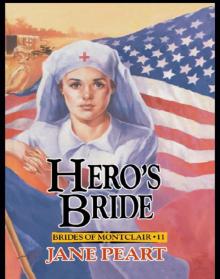 Hero's Bride
Hero's Bride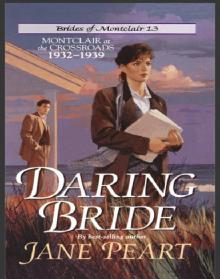 Daring Bride
Daring Bride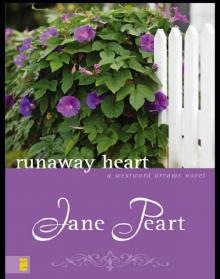 Runaway Heart
Runaway Heart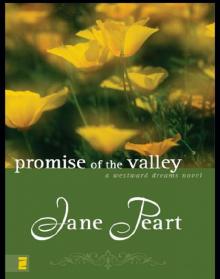 Promise of the Valley
Promise of the Valley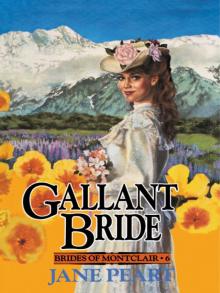 Gallant Bride
Gallant Bride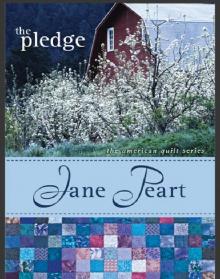 The Pledge, Value
The Pledge, Value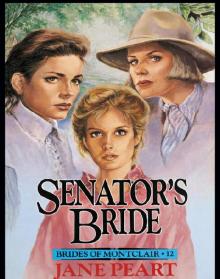 Senator's Bride
Senator's Bride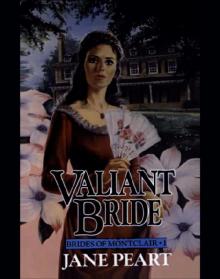 Valiant Bride
Valiant Bride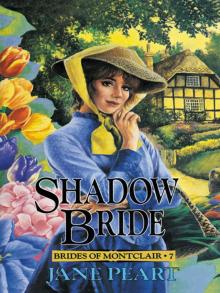 Shadow Bride
Shadow Bride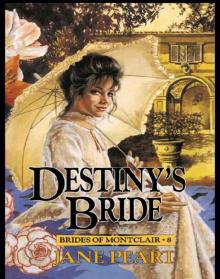 Destiny's Bride
Destiny's Bride A Tangled Web
A Tangled Web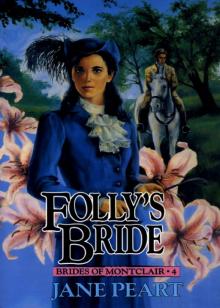 Folly's Bride
Folly's Bride The Promise
The Promise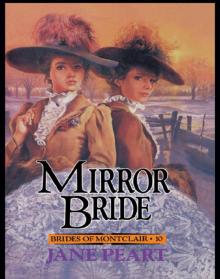 Mirror Bride
Mirror Bride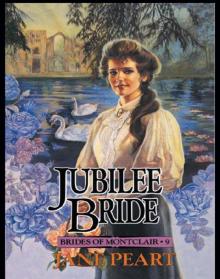 Jubilee Bride
Jubilee Bride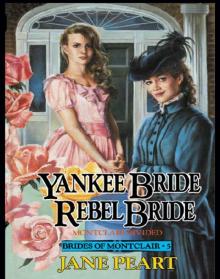 Yankee Bride / Rebel Bride
Yankee Bride / Rebel Bride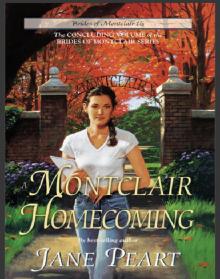 A Montclair Homecoming
A Montclair Homecoming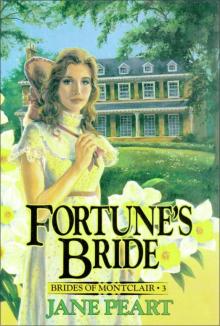 Fortune's Bride
Fortune's Bride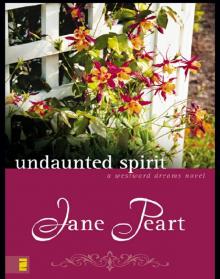 Undaunted Spirit
Undaunted Spirit Love Takes Flight
Love Takes Flight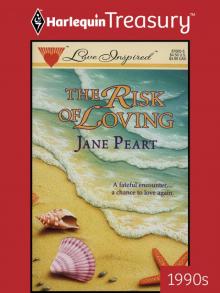 The Risk of Loving
The Risk of Loving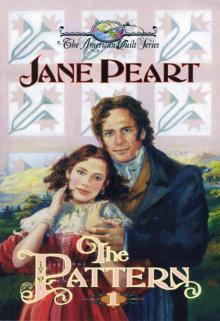 The Pattern
The Pattern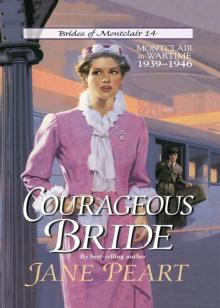 Courageous Bride
Courageous Bride